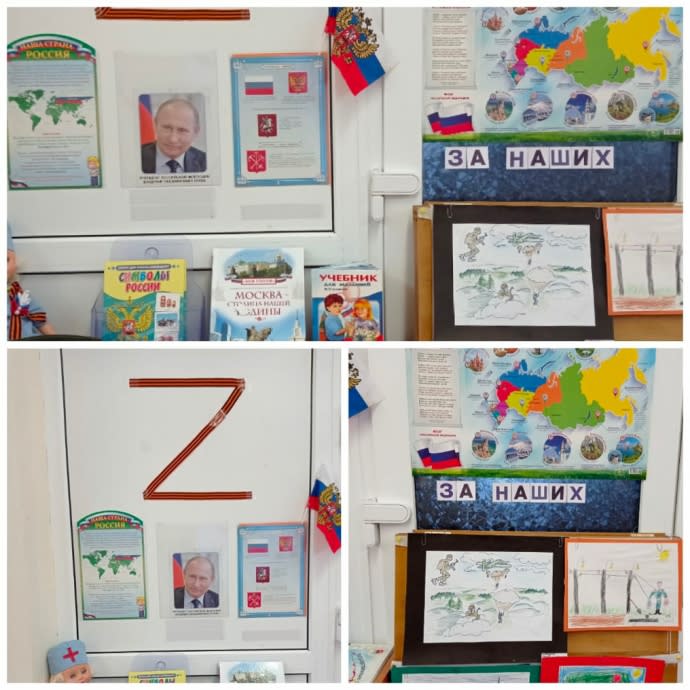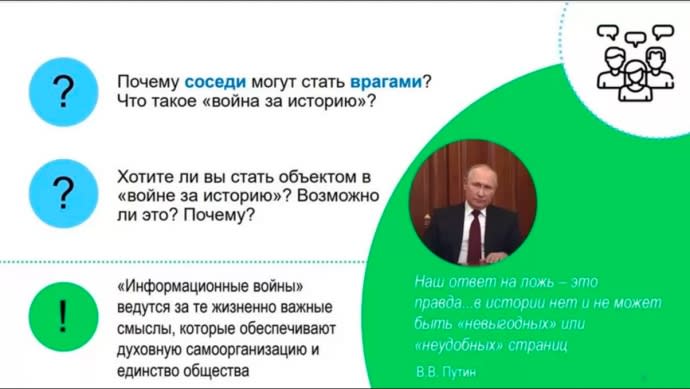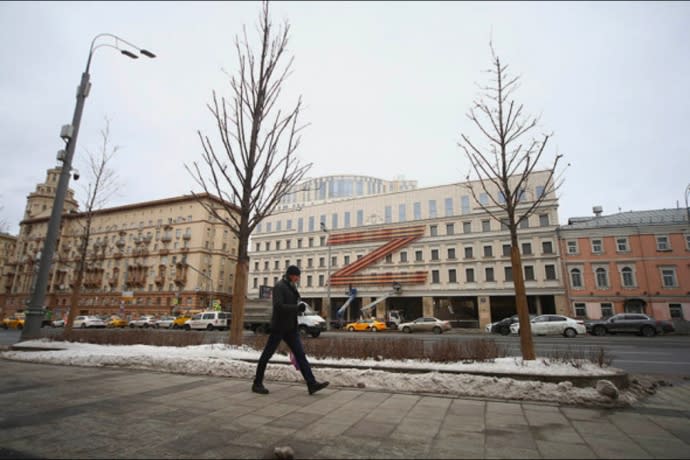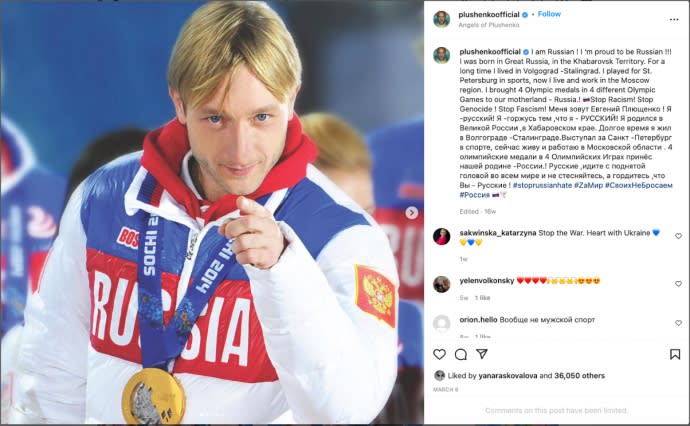From Hermitage to music bands: Heres the true reach of propaganda that makes Russians love war
The latest Russian art exhibitions abroad are a powerful cultural offensive, one can call it a kind of a "special operation". Many don't like it, but Russians are advancing, and no one can be allowed to deter their advance.
This is roughly what the long-term head of the Russian Hermitage, Mikhail Piotrovsky, recently said in an interview with Rossiyskaya Gazeta.
Russian propaganda has never been limited exclusively to what politicians, media and pundits say to achieve the goals set by the Kremlin.
It actually involves mouthpieces from various fields, who simultaneously – and in a controlled manner – say what's needed to be said. Each of them uses the arguments that their audience would understand best.
This is how anti-Ukrainian and anti-Western messages are spread by writers and soldiers, athletes and scientists, astrologers and priests. All of them are part of the genocide against the Ukrainian people, which is happening as a result of massive propaganda.
The initiative How Not to Become a Vegetable, has created a database of 1,800 Russian propagandists and public figures who support the war in Ukraine.
Apart from big names like Margarita Simonyan, it includes representatives of 15 industries involved in the information war against Ukraine and against the West.
[BANNER1]These are not just employees of the propaganda media (629 of them are in the database), the list also includes writers, singers, actors, pro-Kremlin talk show experts, bloggers, military personnel, politicians, athletes, representatives of the Russian Orthodox Church, etc.
In this version of the database, we focused on those who shape the information field of Russian propaganda.
The consequent versions will also include the followers of the so-called "Russian world" and "esotericists" who actively help Russian propaganda.
How does Russia’s propaganda really work
The power of Russian propaganda is in the combination of television and social media. These two channels help "domesticate" the war, as the state tries to make it part of Russians' everyday life. Dr Gregory Asmolov from King's College London talked about this in his research.
The involvement of well-known people from various fields – who tell their audience basically "how to love their family" – is a key tool for this "domestication". For this, Russian propaganda uses a wide range of information channels – from state-owned TV channels to social media profiles of opinion leaders.
Telegram, a messenger app, is starting to play an important role, too. After Russia's regulator Roskomnadzor blocked Facebook and Instagram, many Russians started using it.
Television is also evolving: Along with the classic propaganda shows hosted by Vladimir Solovyov and Olga Skabeyeva, a wide range of other formats has appeared. Social media, for example, has become a frequent source of information and a tool for propagandists.
Talk show "Prekrasnaya Rossiya Bu-Bu-Bu" is a good example. In it, hosts and guests informally discuss topical issues and the latest news. The talk show's segment called "Byesit" (means "annoys" in Russian) is run by Russian designer Artemy Lebedev, and it has become a continuation of his traditional posts on social media, which traditionally begin with the words "more than anything in the world it annoys me that..."
Russian propaganda does not ignore the young audience, which hasn't become attached to TV shows yet and, on social media, consumes only entertainment content.
But they are brainwashed, too. Children's parties at kindergartens and graduation ceremonies – as well as photo albums to mark them – are military-themed. Kindergarten teachers spend hours explaining to kids why the "special military operation" had to begin, while schools hold entire classes to explain the same.
When the full-scale invasion started, an animation film appeared, explaining to children why Russia "had to" attack Ukraine, which did not want to be friends with Russia and insulted others.

Photos published by St. Petersburg’s Kindergarten No. 69 on VK on March 15, 2022. They show a kindergarten wall with portraits of Russia's President Vladimir Putin and the "rashism" Z signs

A screenshot of a presentation slide made for 6-8th graders. At schools, Russian students have to attend special classes where teachers explain to them the reasons why Russia's President Vladimir Putin started "special military operations" in Ukraine
Source: BBC
This way, Russians begin to live in an information vacuum.
Art, music, celebrity gossip, humor, sports – everywhere the Russians are subjected to the same informational background. The result: More and more Russians are dragged into the war with Ukraine. And often it isn't about actually firing bullets, it's about waging the information war.
Creating database of Russian propagandists
The volunteer initiative How Not to Become a Vegetable created the Database of Russian Propagandists and public figures who support the full-scale war against Ukraine and/or were involved in spreading anti-Ukrainian narratives.
Its purpose is to make Russian propagandists and their accomplices responsible for the genocide of the Ukrainian people, in which they participate.
Currently, the database includes the following categories of people: employees of propaganda media (628 individuals), writers (516), singers (145), actors (74), pro-Kremlin talk-show experts (135), bloggers (59), war correspondents (48), politicians (62), athletes (37).
Most of them are Russians, as well as several Belarusian journalists, representatives of ORDLO (occupied territories of Ukraine) and collaborators from Crimea.
They all create and/or spread Russian propaganda. The database also includes some citizens of Ukraine who currently live in Russia and have been collaborators at various times (for example, former MP Ilya Kiva).
As of July 5, 2022, the database contains 1,800 people and will be updated every quarter.
The database has been given to the National Agency for Corruption Prevention, which is analyzing it (at the request of the Ministry of Foreign Affairs) to be able to point at those who foreign partners can and should sanction.
This database will expand the existing list of "candidates for sanctions", which already includes 15,500 individuals and 3,700 legal entities. These are Russian and Belarusian government officials, deputies, military personnel, security forces, judges, oligarchs, politicians and so on.
The database has also become a part of the international RuAssets.com system by YouControl.
The platform gathers information about over 150,000 people and 10,000 organizations, including terrorists, traitors, sanctioned individuals, as well as foreign companies that continue to work in Russia.
Detailed information about the methodology and evidence collection is described on the RuAssets platform.
Here’s how propaganda uses Russian citizens in war against Ukraine
"We didn't invade Ukraine. We declared a special military operation because we had absolutely no other way of explaining to the West that dragging Ukraine into NATO was a criminal act," Russia's Foreign Affairs Minister Sergey Lavrov told BBC.
Vladimir Putin has repeatedly used the same rhetoric to explain his decision to launch an unfounded and unprovoked invasion of Ukraine on Feb. 24.
[BANNER2]Putin's and Lavrov's statements summarise what Russian propaganda is working on. And all important narratives are always spread by opinion leaders from various spheres. The How Not to Become a Vegetable initiative has also collected info about them in the Database of Russian Propagandists. Here are just some examples.
Traditionally, representatives of the Russian Orthodox Church always eco the Kremlin messages. For example, Patriarch Kirill (Vladimir Gundyayev) said, "Russia has never attacked anyone. It's (even) surprising that such a great and powerful country hasn’t attacked anyone; it has only been defending its borders."
"Russians do not start wars, Russians end them," said both leader of the Lyube music band Nikolay Rastorguyev and footballer Roman Yemelyanov on Instagram. They posted their thoughts about Russia's peacekeeping mission and the preventive nature of its actions around the same time.

An Instagram post of the leader of the Lyube music band, Nikolay Rastorguyev, dated Feb. 26, 2022. In it, Rastorguyev says, "Russians do not start wars, Russians end them."
The head of the Russian Hermitage, Mikhail Piotrovsky, made a telling statement about the role of culture in spreading the idea of the so-called "Russian world." "Russia is undergoing major global transformations," he said, "and we, accordingly, are part of them and stand with (the country)."
Piotrovsky went on: "We are all militarists and imperialists... We, people of culture, now need to understand our role in everything that is happening. A person who's involved in history-making must, first of all, be good at what he does, following the principle 'when the guns speak, the muses must too.'"
752 out of 1,800 people in the Database of Russian Propagandists are representatives of the culture industry. They have different roles.

A "special military operation" symbol is attached to the Oleg Tabakov Theater in Moscow
Source: RBC.ru
Some place "Rashism symbols" on the facades of buildings – like the Oleg Tabakov Theater and the Breakthrough of the Siege of Leningrad Museum in St. Petersburg.
Others perform on occupied territories in Ukraine. Singers Yuri Kiselev (YurKiss), Elena Kiselova (Elena Sever), Marina Briz, bands Spb! and Zemlyane, Belarusian singer Ruslan Alekhno and others performed in occupied Kherson. Anna Semenovich and Irina Saltykova performed in occupied Energodar.
Writers also help Russian propaganda.
For example, there has been published a collective statement in support of the war against Ukraine "Who wants victims?". Poetry collections are created and literary festivals are held. The participants of one of them – called "Fires over Donbas" – signed an open letter to Putin, expressing their support of the war against Ukraine.
One of the favorite topics in Russian cinematography is the heroization of the soldiers who fought in WWII, the Afghan and Chechen wars, and, of course, the war against Ukraine. Every year they release films around this topic.
Maksim Fadeev is one of the most famous producers and directors of such propaganda films.
He's made a number of films about terrorists that occupy parts of Ukraine (they're heroes for him): "Donbas in the Line of Fire"; "Ghosts. Soldiers of the Forgotten War"; "His battalion" (in memory of Motorola).
After the beginning of Russia's full-scale invasion, Fadeev filmed in Mariupol, a city destroyed by the Russian army.
Every year, public figures actively support the Immortal Regiment rally, which is held in Russia on May 9. Actor Alexander Oleshko, for example, says that the invasion of Ukraine is needed to finish what grandfathers didn't.
"My civic position is simple and clear," he said. "I am against the war that was declared on our country (Russia). My grandfather fought in the Great Patriotic War against Nazism, and I will never be able to betray him. I'm against 'selective grieving', when you feel sorry for some and don't for others."
Oleshko also appeals to the popular message of Russian propaganda about the alleged long-term shelling of the Donbas by the Ukrainian army in 2014-2021, as a result of which many civilians died.
[BANNER3]This message has become the basis for Russian propagandists' message "war as a way to achieve peace" and, at the same time, a cause for pride.
Singer Nadezhda Babkina, for example, said: "Russia is a country of winners, which can defend its resources, its honor, its Motherland, its people, even if the whole world turns away from us."
Thus, through coordinated actions of the versatile army of propagandists, Russian society is getting more and more militarized. Since the start of the so-called "special military operation", Russian symbols have appeared on the facades of grocery stores, cars, clothes, and even on Easter baskets. In Russia and Europe, rallies have been held in support of Putin's actions in Ukraine.
Here’s how propagandists convince Russians and the world of Russophobia
For a long time, Russian authorities and mass media representatives had been accusing the whole world of Russophobia. Since the beginning of the full-scale invasion, this message has become even more useful for them. Celebrities, athletes and bloggers began to spread it independently. With time, it's transformed into a call for unity, supporting "their own people".

Russian Olympic champion Evgeni Plushenko’s Instagram post dated March 6, 2022. Plushenko, who systematically spreads Russian propaganda messages, published the post, saying, "I am proud to be Russian."
At the beginning of March, former figure skater Evgeni Plushenko published a post on Instagram, saying Russians should be proud of their nationality. "Russians, go with your head up all over the world and do not be shy, but be proud that you are Russians!"
Singer Stas Mikhaylov encouraged to support the war, saying, "Russia has never been loved by anyone, but it has always been feared and will be feared, and therefore respected!"
Rap singer Timati said: "I love this country with all my heart, no matter the circumstances. People say that you can't choose your parents. It's the same with the Motherland."
Bloggers and celebrities popularize slogans on social media like "For Russia" or "We look after our own"; they encourage a sense of belonging to the "great nation". This is massively picked up by their followers.
The hashtag # (#ProudToBeRussian) is one of the examples of how the idea of Russia's unity spreads. All those who left the country have been made "alien" – they were tempted by Western money and they forgot "what the country gave them."
Russian propagandists also try to hold rallies abroad to support Russia. For example, rallies in Italy or Serbia, or the online challenge #StopHatingRussians.
The Russophobia narrative aims to convince that Russia is a victim, not an aggressor.
After thousands of foreign companies quit the Russian market, bloggers threw away or destroyed some of these brands' items that they used to own (Viktoria Bonya and CHANEL), and smashed their iPhones and iPads (MP from Yaroslavl Dmitriy Petrovskiy).
Some also claimed they left Facebook and Instagram, because of the "Meta's permission to call for Russians to be killed" on its platforms – not because Russia's regulator blocked the social media. Also, in reality, Meta's policy was about the Russian military. But posts with false claims were made by many influencers, advertising them on other social media like VK, Odnoklassniki and in the Telegram messaging app.
Meanwhile, messages are spreading that the sanctions against Russia aren't working and will only lead to the collapse of Europe's economy. In this case, the propaganda says that Russophobia does not harm Russia, but on the contrary, those who spread it.
Propagating war is an international crime. Everyone who speads propaganda – which became one of the key reasons for the genocide against the Ukrainian people – must be identified and brought to justice.
Oksana Moroz
